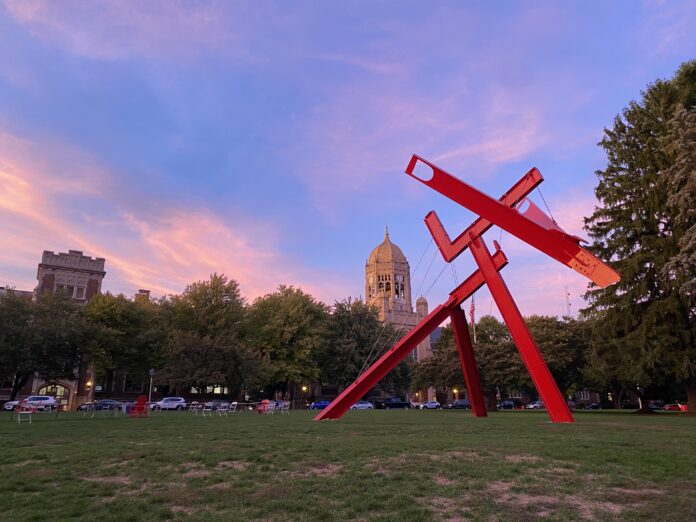Affirmative action is defined by Dictionary.com as “the encouragement of increased representation of women and minority-group members, especially in employment.” Historically, this term has been heavily associated with institutions of higher education. Beginning in the 1960s, certain schools started to consider race as a factor in their admissions processes. Initially, race-based quotas were utilized for collegiate-level integration efforts. While this was struck down in the 1978 landmark ruling California v. Bakke (the original Supreme Court case on affirmative action), the general concept of affirmative action allowing race to be an element of decisions regarding enrollment was upheld.
Assistant Professor of Political Science Ross Dardani, Ph.D., concentrates his scholarship on the U.S. Supreme Court’s influence. Dardani outlined how the current form of affirmative action was essentially constructed by one man: Justice Lewis Powell. According to Dardani, Powell was the swing vote on the Court at the time and while he did not agree with the racial quota system, Powell thought to model affirmative action after Harvard University’s admissions program (the school where he received his Master of Laws degree). Dardani outlined Powell’s stance saying, “the only justification that an institution in higher education can rely on like a law school or med school, college or university, has to be diversity…You definitely can’t use quotas but with this more limited type of affirmative action that is going to be allowed, you have to root it in a diversity interest.”
Thus, affirmative action in its current form was born. Institutions had to prove that race as a factor would only be utilized for diversity’s sake in order to “have people with different backgrounds and experiences and different races… [as] the only way you can really produce newer forms of knowledge and get at the truth and have progress,” stated Dardani. The idea of diversity-centric, holistic affirmative action originated in aparthied South Africa in an attempt to justify university integration, according to Dardani.
Now, in 2022, with the conservatives holding a supermajority in the Court (6-3), these justices feel emboldened to overturn decisions that have held precedents for decades. This was evident in Dobbs v. Jackson Women’s Health Organization this past June in which SCOTUS overturned Roe v. Wade, which granted Americans the right to have an abortion. Dardani speculated whether this phenomenon could extend to other long-held rights saying, “[there] are legitimate concerns to be worried about same sex marriage, to be worried about sexual autonomy and even potentially the right to privacy.”
Two affirmative action cases have been argued in the Court in late October and a decision is expected on them in June 2023. The lawsuits were filed by Students for Fair Admissions, an organization that legally represents students who believe that their race prevented them from being accepted into a college or university, against both University of North Carolina (UNC) and Harvard University. UNC is a public institution, while Harvard is a private university. Thus, both cases were argued on a different basis. The Fourteenth Amendment and Equal Protection Clause are being used to say that public colleges are not providing students with equal opportunity. The Civil Rights Act of 1964 is more relevant to private universities, with the prosecution arguing that the defense is breaking the law by discriminating against students on the basis of race. Muhlenberg College, as a private institution, is presented with legal challenges to its current admissions process, if the Court rules in Students for Fair Admissions’ favor, which Dardani believes they inevitably will.
The College’s Vice President for Enrollment Management, Meg Ryan, set straight some misconceptions about holistic admissions in general, and Muhlenberg’s admissions process, specifically, saying, “In listening to the arguments, it is clear to me that there is a general lack of understanding of what holistic admissions actually means. Muhlenberg practices holistic admissions. There is no one part of an application that means a student is automatically accepted or denied. There is a perception that admissions offices hold two application files next to each other and say ‘which of these two students do we accept?’ That is not how holistic admissions works because no two students have the same experience.”
President Kathleen Harring, Ph.D, furthered this point noting, “Race and ethnicity are part of a person’s whole story, and to truly practice holistic admissions, we consider race when an applicant chooses to include that as part of their application.”
As of now, Muhlenberg’s administration is unsure as to how this likely change will affect their specific admissions program. Chief Diversity Officer Brooke Vick, Ph.D., noted that “it is difficult to say specifically what may change in terms of our approaches to recruiting a diverse student population to Muhlenberg. What I can say, however, is the SCOTUS decision will not change our commitment to building a diverse study body, to welcoming and equitably supporting students from underrepresented backgrounds.”
Ryan described how Muhlenberg will respond to this possible change saying, “Muhlenberg will continue to practice holistic admissions but this may be one piece of data that is no longer included. We already have partnerships with Community-Based Organizations in Philadelphia, Chicago, New York, New Jersey and Florida among others. We intentionally reach out and recruit in high schools that serve large populations of students of color.” Additionally, Ryan addressed Muhlenberg’s dedication to building a diverse community saying, “what [the ruling] won’t change is the care and commitment to diversity that exists in the admissions profession and specifically, here at Muhlenberg.”
A “colorblind” Constitution is the narrative that some of the Court’s justices push when cases regarding race arise. According to those that espouse this belief, race should never hold any legal weight. Dardani commented on this belief saying, “any type of affirmative action policy, even if it is just a holistic approach where you’re factoring in race as one factor among many, for someone who adopts a colorblind approach to the Constitution, any type of factoring in of race is always going to be unconstitutional.” This belief is justified by the Fourteenth Amendment which notes that citizens cannot be denied “equal protection of the laws.” However, to assume that the Fourteenth Amendment, a byproduct of the Civil War, promotes a “colorblind” narrative is patently inaccurate. In his conversation with The Weekly, Dardani mentioned a quote from Chief Justice John Roberts in which he stated that “The way to stop discrimination on the basis of race is to stop discriminating on the basis of race.” This quote exemplifies the conservative justices’ tendency to simplify complex issues by ignoring deeply rooted racist histories. The reality is, the United States’ ties with enslavement and white supremacy are still, to this day, impacting the lives of Black Americans. Additionally, the Constitution was infused with racist (not “colorblind”) elements from its creation, with the Three-fifths Clause counting enslaved Black people as three-fifths of a person, compared to one whole white person. If SCOTUS is unable to grapple with these inherent historical inequities that require systems like affirmative action for some semblance of justice, then the next several decades of a conservative majority will inevitably lead to the rolling back of progressive measures.
Katie is a Media & Communication and Political Science double major in the class of 2024. When she's not working on the paper you can find her blasting Taylor Swift, reading Jane Austen, or crying over Little Women (2019).























